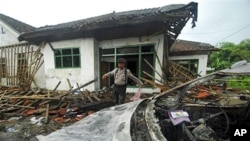The Indonesian government has condemned an attack against members of the Ahmadiyah sect that left three people dead. The minority Muslim sect was banned by the Indonesian government from propagating its beliefs.
Human Rights Watch obtained a video of Sunday's attack on members the Ahmadiyah Islamic sect in the West Java town of Cikesik. The video shows as many as 1,000 Muslim protesters surrounding a house that they said was being used as an Ahmadiyah house of worship.
In the video, the crowd starts throwing rocks, then pursues and beats fleeing Ahmadiyah members. Three have been reported killed.
The Indonesian security minister Djoko Suyanto condemned the violence and promised a full investigation. But he also reminded Ahmadiyah members to obey a 2008 decree banning the group from spreading its beliefs.
Ahmadiyah followers consider themselves Muslims. But they are not accepted by mainstream Islam because they do not believe the Prophet Muhammad was the final prophet. There are about 200,000 Ahmadiyah in the country.
In Jakarta human rights groups protested Monday against religious-based violence. Tangga Pawestri, with a group called the People's Democratic Big Family, says she wants President Susilo Bambang Yudhoyono to do more to protect minority groups.
"We really want him to give a public statement that he apologize, that he failed to protect the rights of the Ahmadiyah groups in all of Indonesia," Pawestri said.
Human Rights Watch Indonesia researcher Andreas Harsono calls on the government to investigate and prosecute those involved in the violence. But he also says the 2008 decree, which has been used to justify violence, needs to be revoked.
"Human Rights Watch consistently, repeatedly asked the president to revoke that decree,” Harsono said. “The government argues that the decree is important to reduce religious tension between the Ahmadiyah and the fundamentalist Muslim. But five years after the decree we have seen more and more violence."
He says there have been about 50 attacks on Ahmadiyah members by Muslim fundamentalist groups in the past year.
Indonesia has the world’s largest Muslim population - over 200 million people. Its secular government and constitution tolerate other faiths. However, some critics say laws on building places of worship and political tolerance for those who wish to enforce a strict form of Islam, have led to discrimination against other religious groups.
Indonesian Government Condemns Attack on Ahmadiyah Group
- By Brian Padden





